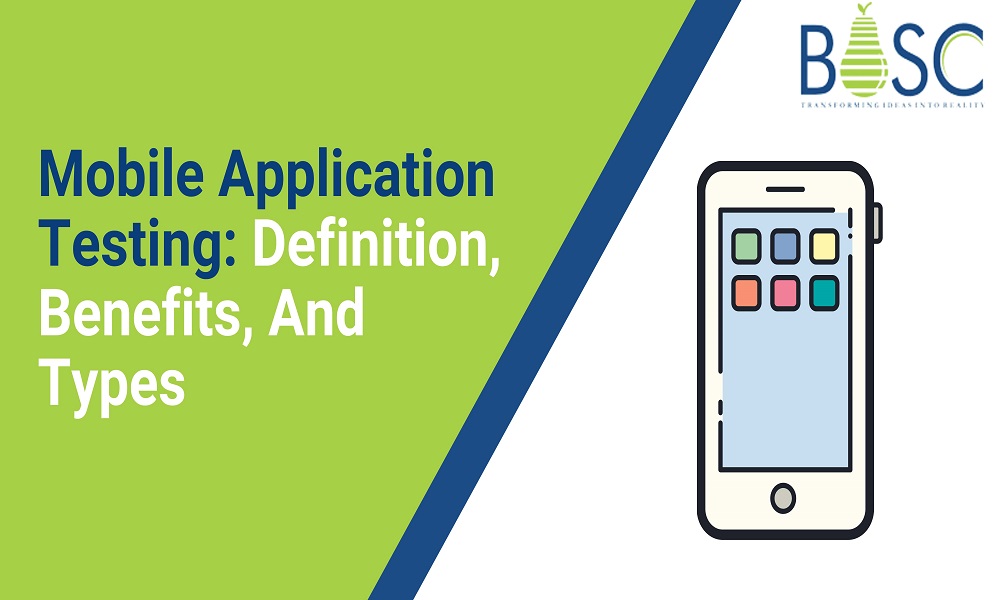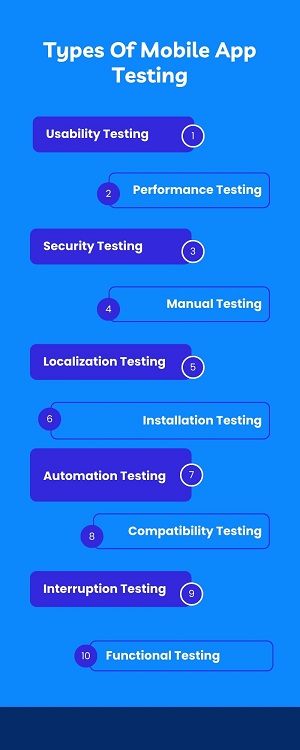
Mobile Application Testing: Definition, Benefits, And Types
Mobile app testing is a vital part of a development life cycle. It allows you to detect the applications’ errors and bugs, and the testing is ongoing as much as possible. As soon as a bug is detected, removing it by not affecting its budget to complete the entire mobile application development deadline is better. But if a test is not done on an ongoing basis, then the risk of errors is detected at the last stage, which increases the workload and affects the complete app development process.
As a mobile app development company, we know how this scenario will impact your business. This article will show why testing is necessary, the type of testing, and so on.
What is mobile app testing?
Mobile application testing is the procedure of checking the correctness of the mobile application in terms of its functionality, performance, and many other factors. It helps to verify that your app has met the technical and business requirements.
To successfully test the mobile applications, a QA team must test the applications across various screen resolutions, operating system versions, and network bandwidths. It aids in giving the surety that your app will work smoothly on distinct device configurations whenever it is released to the public.
However, the testing of mobile application development is done via manual and automated testing. It is efficient to do the mobile app testing on an ongoing basis, at every stage of app development and not just before an app is released to the market. Therefore, testing is necessary for your project to get more users to use your services or products.
Why is mobile app testing necessary?
Developing a mobile app is a procedure that needs ample human resources, money, and time. Undoubtedly, the objective of each development team is to build a successful application. However, testing supports to detection of errors and shortcomings, which must erase before launching the application in the market.
If the mobile applications are not thoroughly tested, then there are chances that users will encounter bugs that will affect the rating of the application. However, the smaller shortcoming or unexpected failures will immediately lead to the uninstallation or abandonment of the application. Hence, it results in the loss of app users and revenue.
It would be best if you did the testing on mobile user experience to get an idea of how well your app will meet user expectations. Hence, it may lead to negative feedback and app removals from end users.
Mobile application testing ensures that a user experience is excellent, regardless of the kind of mobile phone or platform, or OS for which developed an application.
How will app testing benefit your business?
The number of mobile gadgets is increasing day by day. It is assumed that by 2027 the number of mobile phone users worldwide will reach 7.6 billion. It has raised more than double to 3.6 billion smartphone users in 2016. Additionally, there are around 9,000 various kinds of mobile devices. Therefore, every company wants to optimize the application for a device to run smoothly. The app is created with the minimum errors and will develop the minimum abundant rate.
Mobile app testing will help identify an app’s performance, functionality, and appearance on multiple devices. Optimizing your app for mobile OS with your targeted audience helps to give a seamless experience regardless of the device or operating system. Hence, it helps deliver a customer-centric experience for the new users, and you are more likely to reach the audience.
What are the benefits of Mobile app testing?
1. Ensures Proper Functioning of the App
The primary target of the QA process is to make sure that the solution is performing seamlessly. Moreover, the QA experts will test whether users can successfully download the program to many devices. It uses real devices for testing, and an app will come up with a properly functioning product.
2.Increases Customer Loyalty
If the app user has an app’s easy usability and proper functioning, then customer satisfaction will occur. In this way, analytics helps to reach a greater audience and will create a good reputation for a company.
3.High Revenue
The testing process may require investment in the initial development phase to fix the bugs and issues in the ongoing development. Hence, it saves time, diminishes costs, and allows rapid time-to-market. Thus, cooperating with your testing specialist may get high revenue ahead.
4.Reduce App Development Cost
Automated app testing, if used efficiently, lowers the price of an app development project. Testing is the leading cause behind the cost saving that reduces the emergence of the bugs found after a deployment.
However, launching an app that holds defective functionalities may lead to app installation and negative reviews, which creates a negative impression of your brand in the user’s mind. Thus, test your app thoroughly from the initial stages of development.
5.Faster App Development
Automated testing along the Agile development process will aid you in delivering fast app development that may lead to excellent results and increase the ROI. Automation testing reduces an app development life cycle, which leads to speedier app deployment.
Also Read: A Step-by-step Guide to Mobile App Development in 2022
How many types of mobile app testing?
Below is the list of the leading mobile testing types to which well-known testing companies in the USA apply.

1. Usability Testing
Usability testing is ideal for determining how an app makes it easier for users to accomplish their objectives. This test involves assigning a specific, realistic scenario of utilizing the app to particular participants. It is also reliable based on gathering direct feedback from the end user. Hence, usability testing also helps to check whether the design is intuitive and will emphasize ease of use and customer experience.
2. Performance Testing
Performance testing is necessary for mobile app testing that reviews the application’s speed, stability, and responsiveness under various workload conditions. The goal of the performance test is to ensure that the app aligns perfectly with the performance objectives.
Additionally, it addresses the performance bottlenecks before making the apps go live. Bottlenecks are the procedure within the system’s overall functions that will slow down the performance. Hence, the common types of performance tests include load testing, volume testing, stress testing, spike testing, and soak testing.
3. Security Testing
Security is the prominent concern of every mobile app owner in the present times. Approximately 90% of the users are likely to uninstall the application due to security issues. Hence, it is necessary to concentrate on security testing for mobile applications.
There are certain publications, like healthcare app development, that need the personal information of users. As if your app demands something similar like that, then it is necessary to give them a guarantee of confidentiality, integrity, and authenticity of the app. Therefore, the QA team must concentrate on data security and app behavior in the various device permission schemes.
4. Manual testing
It is the approach for navigating the complexity of mobile app testing thoroughly. Manual testing helps in ensuring that the final item is performing ideally as per the intended expectations. QA testing specialists will work in short intervals to review an application that delivers reliable results. Manual tests include physical interface tests, exploratory testing, and complicated tests.
5. Localization Testing
Localization testing is necessary for a mobile application that aims at a specific geographical reason. It is essential to check the mobile application for responsiveness to a region’s particular language and culture-related aspects. Localization testing will identify local currency, time zone, time formats, local regulatory requirements, and text and user interface.
6. Installation Testing
Implementation of Installation testing is ideal for verifying that a mobile app is perfectly installed or uninstalled. Additional installation testing will ensure that the updates are seamless and free of issues. Installation testing also checks for the outcomes when the users do not update the mobile application.
7. Automation Testing
Manual testing is an excellent option for mobile app testing. However, specific mobile app quality tests are very complex and tedious. Mobile app testing automation ideally configures and efficiently executes the automated test and manual testing, giving the best quality of the app and releasing the products faster. Hence, automated testing is a reliable source for time and cost savings on mobile application testing.
Also Read: Mobile App Development Trends For 2023
8. Compatibility Testing
Compatibility testing is the form of non-functional testing that provides the mobile app’s functionality across various OS, applications, devices, internal hardware specifications, and network conditions.
However, compatibility testing is divided into two categories: Backward and forward compatibility testing. Backward compatibility testing identifies behavior and newly developed hardware or software compatibility with older versions. Forward compatibility is the technique that verifies the behavior and compatibility of the build hardware or software with the latest versions.
9. Interruption Testing
Interruption testing is valuable for testing the behavior of an application in the interrupted state before resuming the previous store. For example, interruptions include incoming phone calls or SMS, push notifications, battery low or Full, network connection loss and recovery, plugged in or out while charging, and many more. The app, which usually runs in the background, must resume the previous state before the interruption.
10. Functional Testing
Functional testing of the mobile application is targeted to ensure that every operational aspect of the app is integrated and works in the manner defined by the business needs. This testing type focuses on the app’s flow or business objectives. It verifies that the features of a mobile app must meet the demand and be highly responsive. However, it also demonstrates the ease of sign-up and login and renders the push notifications with the proper functioning of text boxes and buttons.
Conclusion
Every app owner knows this journey of the perfect, flawless, and productive mobile application is complicated. Additionally, we have discussed various types of mobile app testing that deliver the app with the proper functionality. So, plan to test every component before it goes live.
If you want to connect with the best mobile app development company, connect with Bosc Tech Labs, which will evaluate your app’s potential for the targeted audience!
Frequently Asked Questions (FAQs)
1. How are the mobile apps tested?
Mobile app testing involves analyzing the mobile apps for functionality, usability, and visual appeal and is consistent across n different mobile devices. It helps to deliver the optimal user experience without identifying the app accessibility of the device.
2. Can mobile testing be done manually?
You can do the mobile application manual testing utilizing the emulators or simulators and selecting the desired device. You can also do the mobile application manual testing using the actual device cloud or setting up the device lab within your firm.
3. How much time does it take to test the mobile app?
Testing is one of app development’s most essential and critical phases. It usually takes 4-6 weeks to test the mobile.
Book your appointment now